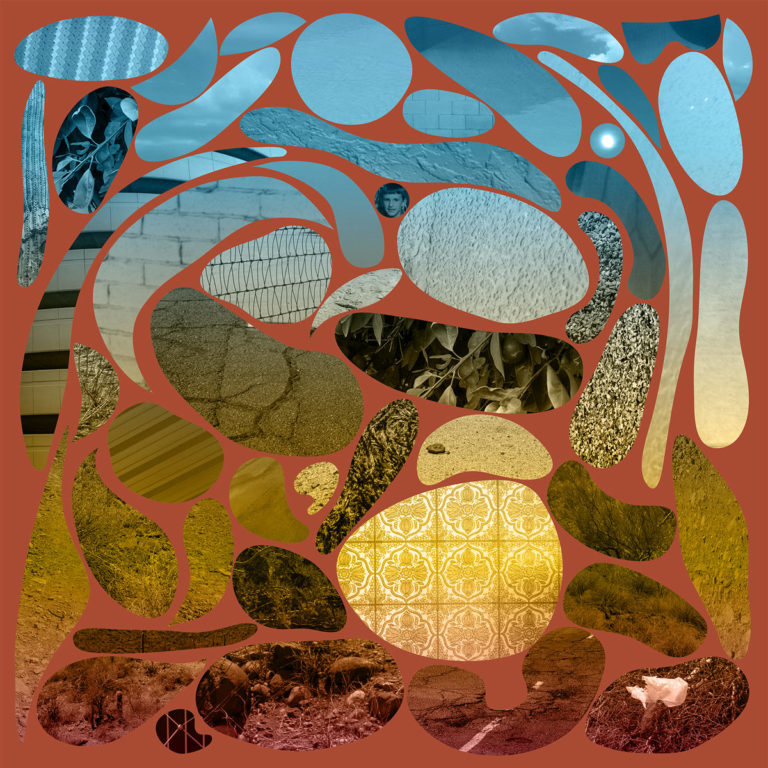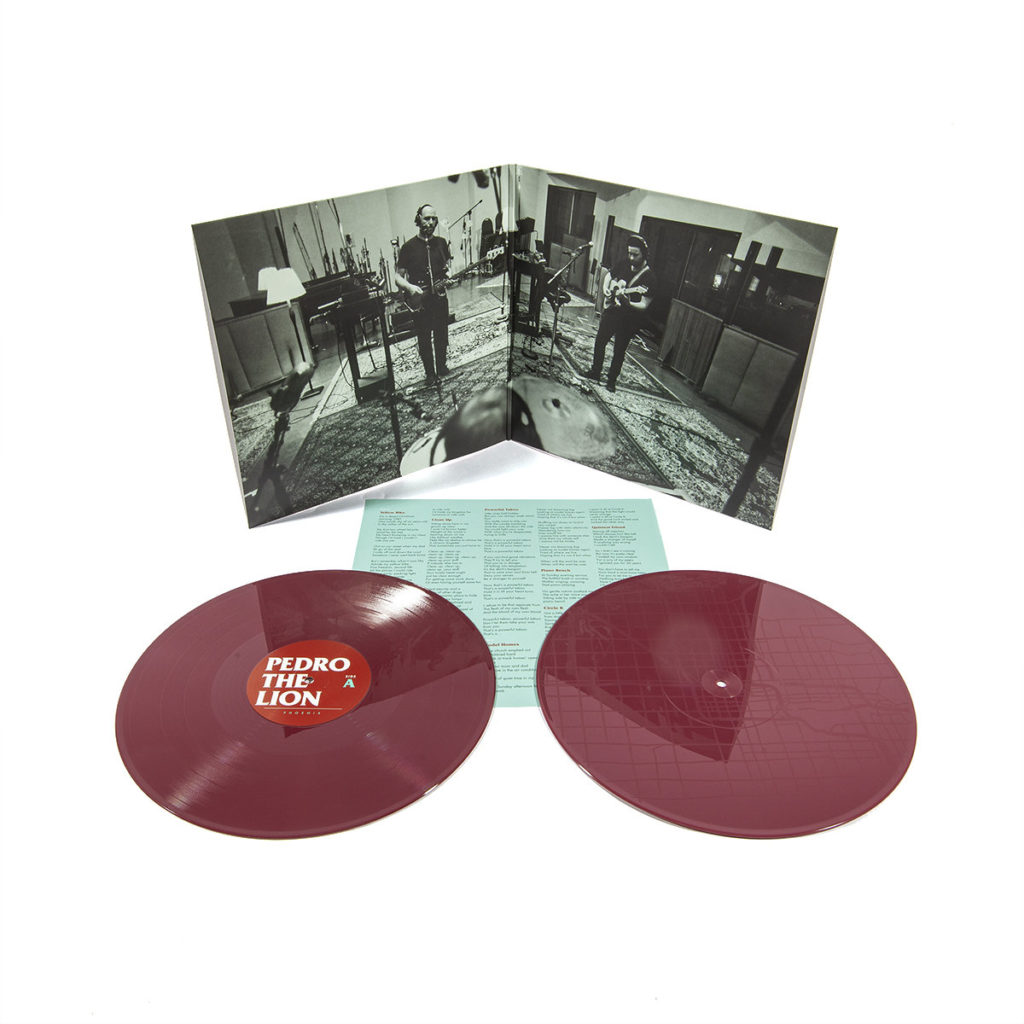David Bazan hasn’t released an album under the name Pedro the Lion for going on fifteen years. It was 2006 when he formally called it a day, the result of a whole host of pressures and complications, and since then Bazan has recorded under his own name. The difference may seem relatively inconsequential seeing as Pedro the Lion was never a “band” in a conventional sense, more Bazan and a rotating cast of support players, but a name is a powerful thing. Apparently the loss had been gnawing away at Bazan in the same way it had his fans, and, joined by Erik Walters on guitar and Sean Lane on drums, Bazan has resurrected Pedro the Lion for a brand new album, Phoenix.
It is tempting to read the title as a reference to Bazan’s return to his old moniker, but the reference is more overtly geographical than mythological. Bazan and his family left Phoenix, Arizona when he was twelve, and the album focuses its lens back on that time. The songs are intensely personal, the irony that abandoning a solo career to pick back up as a band has led to music more introspective than ever not lost on Bazan himself. “I didn’t realize what calling my music Pedro the Lion again would mean to me,” he says, “but it’s re-connected me to parts of myself and my history (both sonic and personal) that I had lost touch with.”
After the organ-like synths of the opening instrumental, ‘Yellow Bike’ opens with a modest and ordinary scene. “On a desert Christmas morning, 1981,” he sings, “one month shy of six years old, in the valley of the sun.” Though the simplicity belies gravity of the song, the first movement of a deep dive into childhood—an anguished but unflinchingly honest reckoning with the past in attempt to reconcile the present.
The song fuses the freedom of his first childhood bike ride with the lingering pain of isolation, feelings that can be extrapolated through to today, projections or self-inflicted fantasies that can come to define a life. A single taut guitar line backs the opening verse, a systolic drumbeat heralding the arrival of the full band, like a new dawn after years as a solo artist.
Placed in the context of a strict Christian upbringing, ‘Powerful Taboo’ plays as an child’s confused attempts to become themselves amidst a maze of barriers, dogmatic rules undermined by forces intrinsic and personal. The experience becomes one of guilt and shame, the middle ground where truths both religious and intimate are betrayed simultaneously in doomed effort to remain faithful to both. Such a predicament haunts ‘Circle K’ too, a tale of a childhood Bazan trying to collect enough pocket money for a Santa Cruz skateboard. The song is ostensibly unremarkable, but the writing and vocal delivery make the image of his child self spending his savings on candy and soda pops suddenly momentous, a harbinger of a thousand adult decisions.
Fittingly then, the salvation imagined on ‘Model Homes’ comes not via self-actualization or some higher power, but rather the offer of better living, a time where scrimping and saving in a lonely town is ended by the lottery of the American Dream. The isolation made clear on ‘Yellow Bike’ is ever-present, and the biggest draw of such a prize is the magnificent company that surely awaits its winners—suburbs as they appear in made-for-TV movies, full of friendly kids and fun adventures.
However the reality is different, and making friends requires compromise and self-deception. The title character of ‘Quietest Friend’ seems to be a part of Bazan himself, a part he kept hidden like Bukowski’s bluebird in an effort to connect with “fickle friends” since he was a child. “I didn’t see it coming but now it’s pretty clear,” he sings, “I traded my own wisdom for a jury of my peers. I ignored you for 30 years.” The accompanying video, directed and shot on 16mm film by Jason Lester, sees Bazan come face to face with this persona, quite literally.
‘Black Canyon’ uncoils slowly into a hard, flat rhythm, as sparse and unforgiving as the desert plains themselves. Based on family stories recalled from his childhood, the song details the aftermath of a road accident from the perspective of the men and women called to the scene. “My uncle Ray was a paramedic,” Bazan’s sings, “one of the first boots on the ground, he saw the man beneath the truck in several pieces, obviously gone.” The song echoes ‘Car Crash While Hitchhiking’ from Denis Johnson’s Jesus’ Son, displaying the same stunned realism in the face of sudden violence, beauty and the grotesque meeting in strange communion.
Such a juxtaposition lies at the heart of Phoenix. Childhood is remembered with intense dread and desperate fondness, a time to be blamed, pinpointed as the beginning of every adult hang-up and dead-end yet still somehow precious, even glorious. “My Phoenix still shines,” Bazan sings on ‘My Phoenix’, where the possessive ‘my’ highlights the track’s position. “My Phoenix will rise.” The idea extends to faith too, the cause of every destructive neurosis that still manages to command thought and awe, an idea hardwired into DNA, too deep for any rational writing off.
If the vision of the Christ
My family sees
Is my blurry vision’s greatest enemyThen I still try to tune it in
When I get lonely
You know I chase around this desert because I think that’s where you’ll be
[bandcamp width=100% height=120 album=169508148 size=large bgcol=ffffff linkcol=0687f5 tracklist=false artwork=small track=2906697930]
Closing track ‘Leaving the Valley’ finds the Bazan family crammed into a U-haul and moving on from Arizona, and, as is the way of things, the conclusion triggers affection. A perfect home it might not have been, but it was a home nonetheless, and nothing is more appealing to those destined or cursed to keep moving on. “How do you stop a rolling stone?” Bazan asks, “How will you know you’re finally home?”
The songs ends with a list of places and images from the desert, an incantation of pure nostalgia and also in many ways the recipe for the present day Bazan—the shaping influences, the unshakeable wishes, the things made forever sacred purely by happenstance. If Phoenix is, as Bazan says, “the result of mining your past for who you are now,” then listening to the record feels like spending a restless night at his side, watching as he examines a disparate series of scenes from his life, his origin story, projected onto the ceiling, the room cast in a wistful Super 8 glow.
Phoenix is out now on Polyvinyl Records. You can get it in a variety of formats from the Polyvinyl webstore or the Pedro the Lion Bandcamp page.


